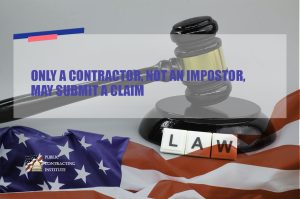An Air Force contracting officer (“CO”) receives an email referencing Contract No. H92237-13-C-5002 (the “Contract”) for general labor services for a base in Afghanistan. The General Director of Tawhid Afzali Construction Company (“TACC”), Mr. Muhmmad Nazeer, states in the email that his company did not receive payment for the three year old Contract, enclosing a purported copy of the Contract which was dated three years prior and showed a face amount of $72,400. The information on the face of the Contract contradicted the original award determination in the contract file which stated that “it is determined that Najibullah Rahmal, in the amount of $94,240, is most advantageous to the government.”

The CO has no copy of the Contract in the file, and no record of an award being made to TACC. The CO asks for supporting documentation from TACC, including invoices, name of the Contracting Officer Representative, and the solicitation. TACC did not provide the details.
The CO contacts an investigator with the Special Inspector General for Afghanistan Reconstruction (“SIGAR”), and the investigator contacts TACC, requesting that the company come to Bagram Airfield with its supporting documents, showing it performed the work, and bringing with it the contractor licenses required to perform the Contract. TACC refused to identify themselves or cooperate. The official point of contact for TACC was contacted, and the person had no idea who could be making these claims and was unaware of the Contract. SIGAR recommended that the issue be closed, because the investigator believed the person who contacted the CO was an impersonator.
The CO denied the claim because the awardee was Najibullah Rahmal, not TACC.
The Armed Services Board of Contract Appeals (“ASBCA”) considers TACC’s appeal and states:
- The Contract Disputes Act, 41 U.S.C. §§ 7101-7109 requires that a claimant be a “contractor” but the only credible contractor here was Najibullah Rahmal, not TACC.
- There was no demand for a “sum certain,” as required by the Contract Disputes Act.
- TACC failed to submit a proper claim to the contracting officer, as also required.
For all these reasons, the Board dismissed the appeal for lack of jurisdiction.
The Takeaway: Government contracting officers must be vigilant about impersonators or impostors who may seek to submit claims for money. The CO in this case sought proof (documentation), scoured his file, and because of the unusual nature of the claim, contacted investigators before acting. Lacking any proof, the CO denied the claim, and so did the Board. All of these actions are consistent with the CO’s and the ASBCA’s responsibilities as a guardian of U.S. Government funds.
For other helpful suggestions on government contracting, visit:
Richard D. Lieberman’s FAR Consulting at https://www.richarddlieberman.com/, and Mistakes in Government Contracting at https://richarddlieberman.wixsite.com/mistakes/.
